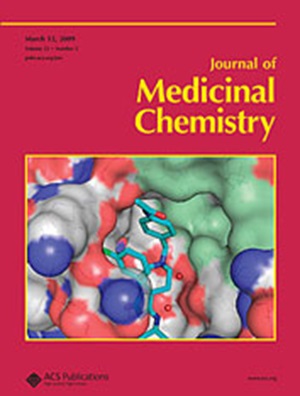选择性PAK4降解物治疗肺肿瘤转移的设计、合成及生物学评价
IF 6.8
1区 医学
Q1 CHEMISTRY, MEDICINAL
引用次数: 0
摘要
PAK4是II组PAK中研究最多的成员,在多种癌细胞信号通路中发挥重要作用。迄今为止,只有PAK4抑制剂KPT9274处于临床开发阶段,没有详细的结合机制。PROTAC技术为通过选择性蛋白降解研究PAK4提供了新的机会。在这里,我们报道了CPS-021的开发,这是一种选择性PAK4降解剂,来源于我们之前报道的与泊马度胺偶联的化合物CPL-042。CPS-021在DC50 = 50 nM时诱导PAK4选择性降解,并表现出明显的抗迁移和侵袭活性。A549-luc体内肺转移模型表明,CPS-021能有效抑制裸鼠体内肿瘤细胞的侵袭和转移。我们的研究结果证明PAK4选择性降解物在抑制癌细胞迁移和侵袭方面具有显著的药理作用。这些结果支持CPS-021作为II类PAKs深入生物学研究的有价值的工具化合物的进一步开发。本文章由计算机程序翻译,如有差异,请以英文原文为准。
Design, Synthesis, and Biological Evaluation of Selective PAK4 Degrader for the Treatment of Lung Tumor Metastasis.
PAK4, the most studied member of group II PAK, plays crucial roles in multiple cancer cell signaling pathways. To date , only PAK4 inhibitor KPT9274 is under clinical development with no detailed binding mechanism. The PROTAC technology offers a new chance to study PAK4 by selective protein degradation. Here, we report the development of CPS-021, a selective PAK4 degrader derived from our previously reported compound CPL-042 conjugated to pomalidomide. CPS-021 induced selective degradation of PAK4 with DC50 = 50 nM and exhibited significant antimigratory and invasive activity. The A549-luc lung metastasis in vivo model demonstrated that CPS-021 effectively inhibited the invasion and metastasis of tumor cells in nude mice. Our findings provide evidence that the selective PAK4 degrader exhibits significant pharmacological effects in suppressing cancer cell migration and invasion. These results support the further development of CPS-021 as a valuable tool compound for conducting in-depth biological investigations of group II PAKs.
求助全文
通过发布文献求助,成功后即可免费获取论文全文。
去求助
来源期刊

Journal of Medicinal Chemistry
医学-医药化学
CiteScore
4.00
自引率
11.00%
发文量
804
审稿时长
1.9 months
期刊介绍:
The Journal of Medicinal Chemistry is a prestigious biweekly peer-reviewed publication that focuses on the multifaceted field of medicinal chemistry. Since its inception in 1959 as the Journal of Medicinal and Pharmaceutical Chemistry, it has evolved to become a cornerstone in the dissemination of research findings related to the design, synthesis, and development of therapeutic agents.
The Journal of Medicinal Chemistry is recognized for its significant impact in the scientific community, as evidenced by its 2022 impact factor of 7.3. This metric reflects the journal's influence and the importance of its content in shaping the future of drug discovery and development. The journal serves as a vital resource for chemists, pharmacologists, and other researchers interested in the molecular mechanisms of drug action and the optimization of therapeutic compounds.
 求助内容:
求助内容: 应助结果提醒方式:
应助结果提醒方式:


